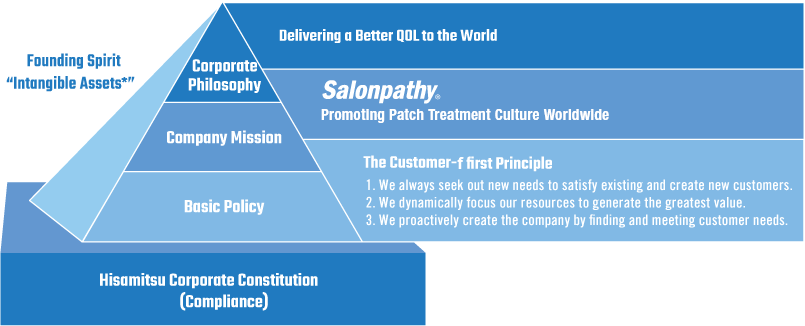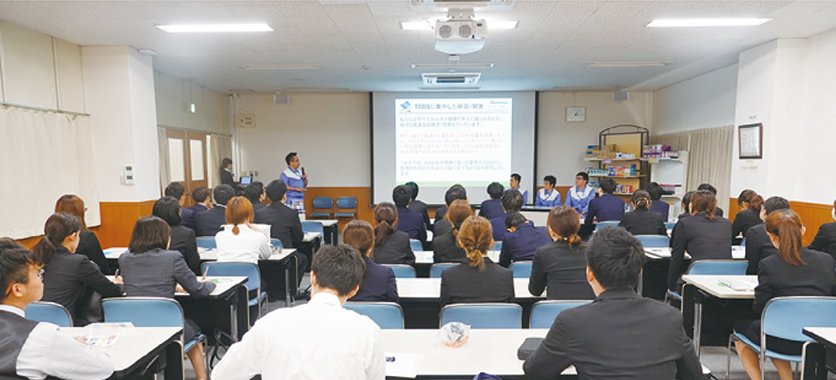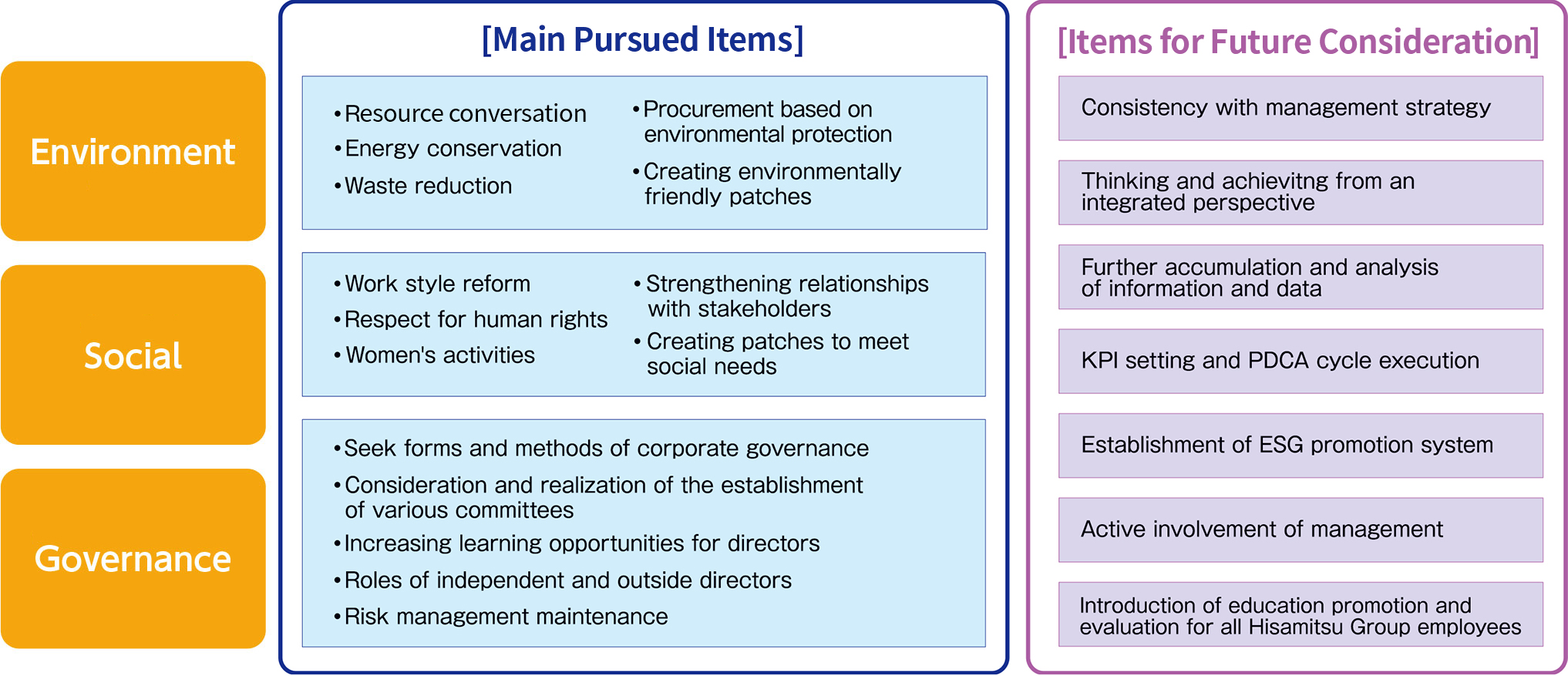Corporate Social Responsibility2020
Hisamitsu Pharmaceutical's CSR
Corporate Philosophy and Company Mission
Since the launch of ASAHI MANKINKO® in 1907 as a medicine applied as a “patch” to relieve pain and stiffness, the transdermal pain relief patches best known as SALONPAS ® have been appreciated by many customers.
We have concentrated on creating and improving products and improving manufacturing technologies for medicinal patch products based on our world-renowned transdermal drug delivery systems (TDDS), with the term Salonpathy® embodying our wish to introduce the benefits of patch treatment and convey the impressive and reassuring relief patch treatment brings to even more customers.
We will continue to develop our business based on our corporate philosophy of “Delivering a Better QOL to the World” and our mission of “Promoting Patch Treatment Culture Worldwide.”
CSR Approach
Hisamitsu Pharmaceutical’s business activities are supported by many stakeholders. Earning and maintaining the trust of all these people is the foundation upon which we are able to achieve our company mission and sustained growth.
We also believe that environmentally friendly business activities, such as reduction of environmental impact and environmental preservation, are key to us continuing to conduct our business activities. To develop a more affluent society and preserve the global environment, we will respect our diverse stakeholders in Japan and around the world while conducting activities in good faith, carrying out the responsibilities entrusted to us and making contributions to society.
*Raw materials and food provided from the ecosystem,flood regulation function, and recreation function, etc.

Positioned as the Founding Spirit of Hisamitsu Pharmaceutical is the belief that corporate value resides in the trust placed in our
corporate approach and our actions based on this approach and that if we continue to practice strong ethical values in our
activities, we will be able to gain a great deal of goodwill in the form of support and trust.
Stakeholders
It is essential to face stakeholders in good faith and understand their expectations and demands sufficiently in order to increase their trust in us and achieve sustainable management.
We conduct stakeholder engagement through a wide variety of opportunities and disclose information, thereby enhancing our corporate transparency.
Relationships with Our Diverse Stakeholders
 |
Customers who use our products and services are not only consumers but also patients, with whom we must establish beneficial relationships and exercise abundant consideration in order to earn their trust. |
|---|---|
 |
Stable procurement of raw materials in and out of Japan and maintaining high quality are essential in pharmaceutical manufacturing. We build trustworthy relationships with our business partners so that we can meet the diverse demands of society, including those for environmental considerations and worker management in production settings. |
 |
Employees are important stakeholders. We must conduct our business activities while mobilizing diverse personnel with a wide range of skills and roles. To do this, we must conduct management that takes into consideration employment-related issues, education and training, welfare and benefits, and employees’ livelihoods. |
 |
We are listed on the stock exchange in Japan and have relationships with many shareholders and investors. We work on an appropriate distribution of profits and transparent management activities, and we intend to gain understanding for our management and business activities through the pertinent and timely disclosure of information. |
 |
We conduct business activities at many locations in Japan and around the world. We must maintain favorable relationships with the citizens of the local communities in which we do business and proactively conduct initiatives aimed at developing those communities as one of its members. |
 |
The existence of all stakeholders is predicated upon the global environment. At the very least, we have a duty to consider the global environment, including aspects such as living environments, resources, and energy, and it is our responsibility to future society. It is essential that we protect the global environment, which in turn protects diverse ecosystems, and when necessary, also work to restore the global environment. |
Stakeholder Engagement
We held dialogues with students from the School of Pharmaceutical Sciences at Nagasaki University who visited the Tosu Factory and researchers at the Research and Development Headquarters.
We received questions and opinions unique to the School of Pharmaceutical Sciences, such as those concerning the mechanisms of patches and the processes of R&D and clinical testing. In order to ensure that our company can be counted on by the younger generation, it is necessary to utilize these opinions in product development.
In addition, industry-academia collaborations greatly contribute to the revitalization of universities and regions and the development of our company. Through such engagements, we will continue to create new value.


Hisamitsu Pharmaceutical Group ESG Promotion
The promotion of ESG is an important initiative as a foundation for realizing our corporate philosophy. Content to be addressed in environment, society, and corporate governance initiatives individually are closely related to the “improvement of operational efficiency” and the “enhancement of human resource development.” The content of our “Main Pursued Items” are based on content that has been emphasized in recent years as non-financial aspects of corporate evaluation.
“Items for Future Consideration” are items that were emerged after verifying CSR activities up to that point and should be established promptly to achieve our 6th medium-term management policy.

Challenges in the Value Chain of Hisamitsu Pharmaceutical
In FY 2018, we scrutinized individual items for consideration. In FY 2019, based on the challenges revealed in each item, we reviewed the risks and opportunities in the entire value chain and selected specific themes on which we would work. To solve these challenges in an integrated and secure manner, we have begun to establish a system to promote ESG measures as a corporate group.

●Examples of the challenges in the value chain
| Hisamitsu Pharmaceutical’s Value Chain |
Examples of the Challenges |
|---|---|
| Raw material supply chain | Establishing an appropriate labor environment at raw material production sites, addressing child labor, and ensuring raw materials in consideration of climate change |
| R&D / product improvement | Ensuring intellectual property rights, ensuring R&D pipelines, and proceeding with environmentally friendly product development |
| Production | Promoting environment, health and safety (EHS) measures, improving labor productivity, and responding to legal regulations |
| Transportation / distribution | Improving distribution networks, ensuring transportation channels at the time of disasters, and reducing CO2 emissions |
| Sales | Proceeding with globalization efforts, proceeding with compliance efforts, communicating product information, and responding to revision of drug price standards |
| Consumers / disposal | Disseminating product information, responding to side effects, and recycling products after use |
